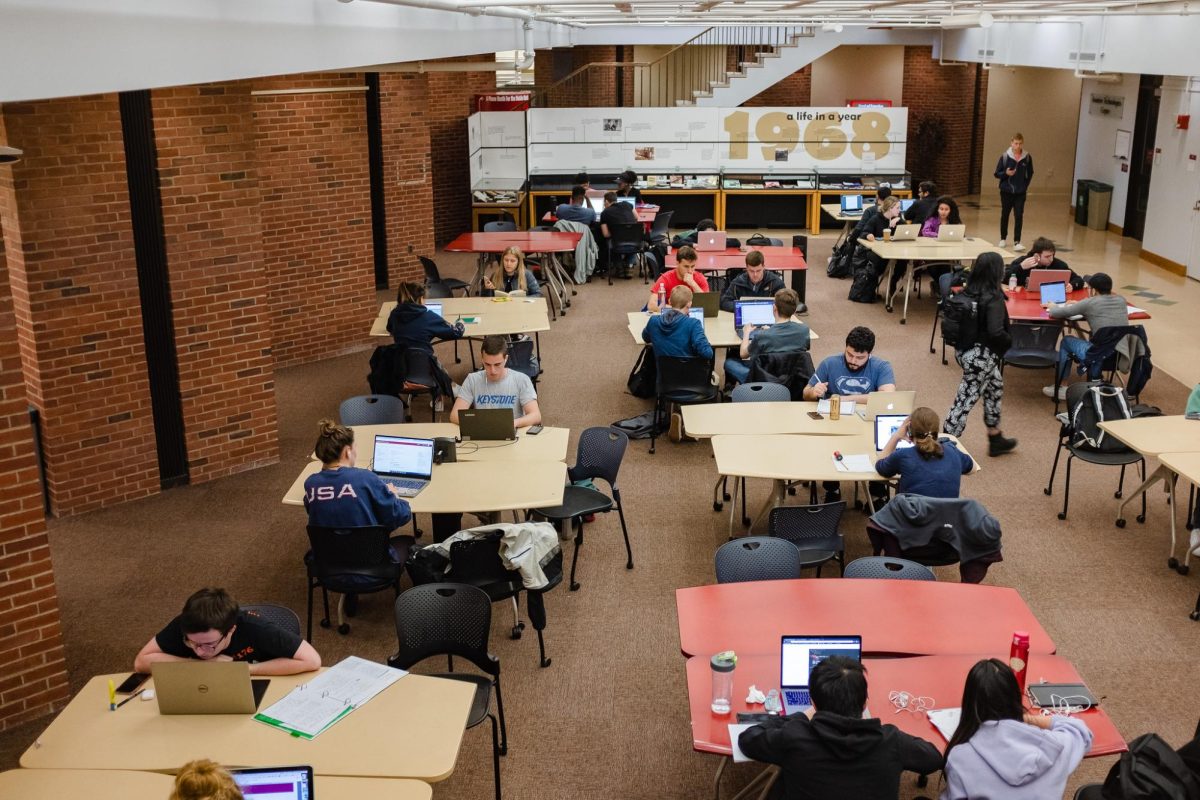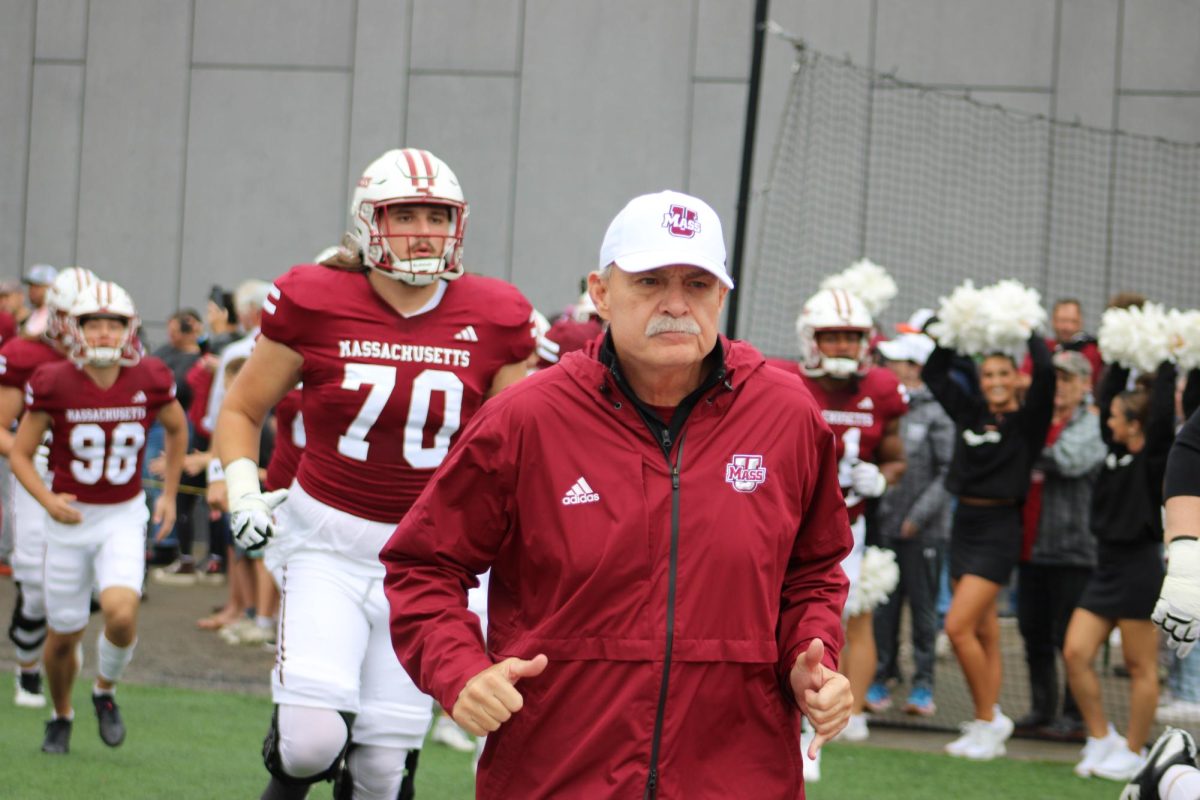When I was a freshman, there was a rumor floating around that the W. E. B. Du Bois Library would stay open 24/7 during finals week. Since my roommate would go to bed around 9 p.m. and often got distracted by my desk decorations, I was relieved. I thought that during finals I would have a productive space to turn to when I was having trouble focusing. Instead, I found myself kicked to the curb at midnight as the library closed, stressed, chilly, and most of all, angry.
I gave the library the benefit of the doubt as the pandemic continued to affect various establishments in spite of the widespread implementation of the vaccine. However, it has been three years since then, and the library has not expanded their hours but has cut them back further. Now, Du Bois starts ringing its maddening bells at 10 p.m. going all the way to 11 p.m.. The Science and Engineering Library (SEL) is not any better, closing its doors at 10 p.m. most days, 5 p.m. on Fridays and are closed completely on Saturday. Work doesn’t go away on the weekend; if anything, the weekend is a time to catch up and get ahead on work. So why are study space hours even more limited during these times?
While workers deserve some time off on the weekend, students still have pressing assignments due and completing them at their dorm isn’t always an option. Some students, like myself, need to have a separate study space in order to get work done. Everyone works differently, and for some that may mean shutting themselves in a room, but for others, a public setting is required in order to study. Aside from work habits, some students are subject to bad roommates and even worse neighbors. Finals and quiet hours do nothing to prevent a party above you practically shaking the walls with their music, or your roommate from deciding they need to get some practice for their recital in your room instead of the Fine Arts Center. Having a space for students to work outside their living space is essential.
Due to what I charitably assume to be the lack of funding that the libraries receive, they have purposely been understaffing themselves for the past few years. At the end of 2022, my friend applied to work at the SEL. As they went through the application process it became clearer and clearer that the library had no intention of hiring them, and upon consulting others that applied, it seemed that they were not alone in this observation. The library needed more workers, yet no one was being hired.
Blame can’t be placed on the libraries though: understaffing and cutting hours is a reflection of poor funding rather than selfish workers. No one should be forced to keep a library open on overtime for a bunch of caffeine junkies. Surely, the University of Massachusetts can move around a little money from overpriced studio apartments to staff their libraries a few hours longer during the week.
This is, however, merely a suggestion based on my own observations. Besides, a lot can change over a year. Regardless, it’s important to recognize that libraries are important spaces that need more funding. Du Bois and the SEL are more than just a study space for those seeking refuge and efficiency; these places provide essential services and resources. Libraries offer everything from printing and sound rooms to something as simple as a snack at times. These resources and spaces remain open long after other campus buildings close. To watch the library become a shell of what it used to be is disheartening, as I know it could once again become a guaranteed shelter for students who require a space to study. The library needs to be open more hours to provide students with such a space, but it won’t come without a greater appreciation of these settings and the people who run them.





















Ed Cutting -- EdD 2012 • Nov 29, 2023 at 4:23 pm
Circa 2011, the library was open from Sunday morning through Friday evening — the only times it was closed was Friday and Saturday nights.
.
This was all semester and not just during finals week and it was a Godsend, I wouldn’t have been able to finish my dissertation without it. There actually WERE people doing actual schoolwork at 2 AM and more than a few blurry-eyed students who showed up later that morning with a paper that otherwise wouldn’t have been submitted on time.
.
The other thing it did was make the library less crowded. There is a finite number of students needing to use the library and the students using the library at night reduced the number of students using it during the day.
.
There were, however, two problems. The first was the mental health of the student workers — regular employees can be hired knowing either that they will be working third shift or be rotated through third shift — the UMPD hires young officers that know they are going to be working the overnight shift, as does the physical plant (someone’s gotta keep the steam plant going) and a lot of academic buildings are cleaned at night.
.
These people arrange their schedules around this and sleep during the day. But the student workers didn’t/couldn’t and weren’t sleeping *at all* — this led to at least one psych committment (that I know of). And instead of hiring additional classified staff (which would have cost more), the library bullied students to work the overnight shifts.
.
The second issue was “sexileing” — a roommate unable to sleep in the dorm room because the roommate was having sex there. You could always tell because it was someone (usually female) who was struggling to stay awake and always checking the time until the prearranged time (always on the hour, e.g. 2AM, 3AM) when she could go back to the dorm and sleep in her own bed.
.
A competent Dean of Students Office, that actually cared about students, could have dealt with both problems. — telling the library that students couldn’t work 11-7 if they had morning classes, and telling what’s now ResLife to address sexileing but the last people in that office who cared about students retired in 2008.
.
Everything else is bull — the library staff didn’t like to have to work overnight (who would?) and invented a lot of potential problems that didn’t happen. Maybe a few kids found a dark corner to have sex in, but that couldn’t happen at 9PM — or 9AM– if students were so inclined? (The camera and monitor that I assume is still by the front entrance was installed in the 1990s in response to sex in the men’s rooms, and that was when the library closed at 5 PM — it was non-students coming in.)
.
And UMass didn’t want to spend the money. If you increase the number of students then you need to increase library resources — either in physical size or hours — and UM won’t.
Josephine Shih • Nov 1, 2023 at 6:04 pm
Hi this is coming from a student who works at the library. Though I wasn’t around during the 24hrs days or the pandemic, I have had chats with my supervisors about this same question. Beyond being severely under funded and understaffed, there were a lot of issues with liability if students that stay overnight and end up injuring themselves / hiding in cases of emergencies. I don’t think it’s very good journalism to just write based on “observations” without talking to the people that are actually working the libraries (in addition to calling them “caffeine junkies”), since the article only mentions personal accounts or stories from friends. While I agree that our libraries (just libraries in general actually) should be better funded and that there should be 24hr spaces on campus for students to study, having the library be that space isn’t necessarily a good idea. It might make more sense for some place like the Student Union or another academic building, instead of the 26th story library that requires a lot more staffing to “patrol”.